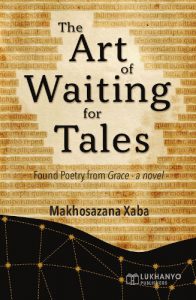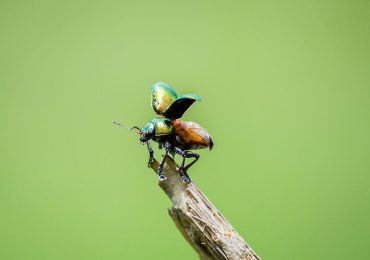The JRB presents an excerpt from The JRB Patron Makhosazana Xaba’s new collection of poetry, The Art of Waiting for Tales: Found Poetry from Grace.

The Art of Waiting for Tales: Found Poetry from Grace
Makhosazana Xaba
Lukhanyo Publishers
Find ordering information below
To quote the author, these poems originate from ‘a challenge to my writerly self’. They are part of an ongoing project of Xaba’s—namely, making found poetry from South African women’s writing.
So far, Xaba has published poetry emanating from the work of Lauretta Ngcobo (in Scrutiny2: Issues in English Studies in Southern Africa, Vol. 22(1) 2017); Barbara Boswell’s Grace (as collected in the new book featured here); Mohale Mashigo’s novel The Yearning (as published in The JRB 2018 Conversation Issue); and Lindiwe Mabuza’s Preface to Malibongwe (included as part of Xaba’s Introduction to the new edition of that book).
Xaba writes in her Preface:
‘The Art of Waiting for Tales is a manifestation of what it means to show up for one another as Black women writers. It is a product of a political imagination. This is the kind of imagination that has a higher purpose than an individualised creativity and focus on oneself; it reaches out and pays tribute to the community of writers and readers, and therefore it is a political initiative. It is political-and-feminist because it prioritises another woman’s writing and consequently builds a text-founded bridge of a feminist sisterhood and solidarity. […]
‘A journey that began with a challenge to my imaginative-yet-unsure self, shifted to an experiment in creativity, and moved to an engagement with poetry as a genre in ways I had not done before. Thanks to Lauretta Ngcobo, Mohale Mashigo, Lindiwe Mabuza and Barbara Boswell who weaved words that possessed a wisdom and energy of their own: birthing other creative entities. The process ended as an even higher honour and regard for Boswell’s writing.’
Xaba’s rules to guide her writing of found poems are:
- Wait for words to lift off from the page instead of searching for them.
- Use these words sequentially in piecing together the poem and never go backwards in the text.
- Use words as they are without changing them.
- Choose the title from the body of the found poem, one that best represents the essence of the poem. This is a variation of the rule I made when working on Ngcobo’s novel, where the first words to show up became the title of the poem.
Read an excerpt: three poems:
~~~
Home. At 21 Saturn Street.
Grace’s Cross
The house on Saturn Street was her cross.
It was always with her. Like the scar on her left wrist
It poked and taunted her.
She would find herself returning to the place,
A ghost haunting the past. On such nights
Distance and time dissolved.
On this Normal School Day
Grace sipped her tea.
Her mother stood over her with a faraway smile.
The southeaster moaned in low complaint.
The sun made a feeble attempt to warm the day.
As she turned the corner of Saturn Street
Grace hunched forward, the devil was dancing in this wind.
The southeaster was a male wind
Always trying to lift women’s skirts.
A row of armoured vehicles rolled slowly
Past the school’s front gate. Grace ran
Across the field towards the quad.
Something wasn’t right.
Grace remembers being at
the beach with Mary and Patrick.
Swartklip Beach: a Memory
They arrived at the beach.
The wind whipped sand into their faces.
Jagged rocks assaulted the soles of their feet.
Droplets of spray clung to the air.
Patrick plunged into the churning ocean.
His muscled back rose and fell, slicing the waves.
~~~
Order The Art of Waiting for Tales directly from Lukhanyo Publishers:
- Deposit R210, plus R99 for shipping (total R309), into the following bank account:
- Standard Bank, cheque account number 10152883256, branch number 051001.
- Use your name and surname as the reference.
- Send your POP to 081 265 1247 or lerato@lukhanyopublishers.co.za with your courier address or nearest Pep Store.
~~~
- Makhosazana Xaba is a Patron. She is the author, most recently, of the collection of poems The Alkalinity of Bottled Water (Botsotso, 2019) and the editor of Our Words, Our Worlds: Writing on Black South African Women Poets, 2000–2018 (UKZN Press, 2019). She is currently a Research Associate at the Wits Institute for Social and Economic Research (WiSER), working towards a biography of Noni Jabavu.





